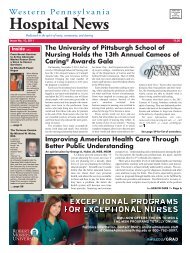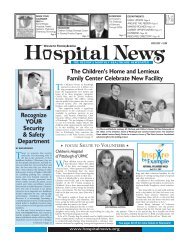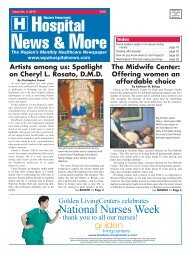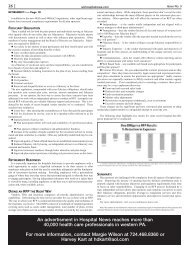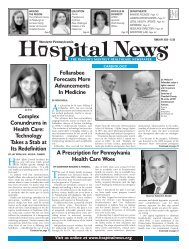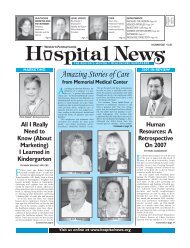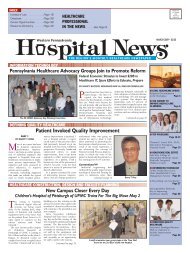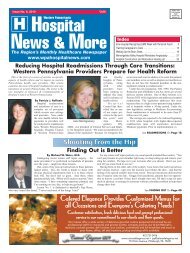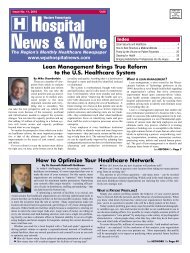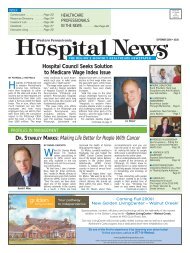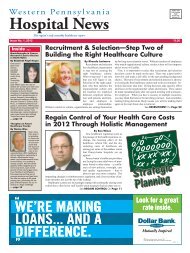McKeesport Hospital Foundation holds 33rd annual Invitational ...
McKeesport Hospital Foundation holds 33rd annual Invitational ...
McKeesport Hospital Foundation holds 33rd annual Invitational ...
You also want an ePaper? Increase the reach of your titles
YUMPU automatically turns print PDFs into web optimized ePapers that Google loves.
26 | Issue No. 5wpahospitalnews.comSame as it ever wasBy Paul BrahimOn December 31, 1932, Alfred Cowles, III presentedthe paper “Can Stock Market Forecasters Forecast?”to a joint meeting of the Econometric Societyand the American Statistical Association in Cincinnati.Cowles, founder of the Cowles <strong>Foundation</strong> forEconomic Research at Yale University, studied thestock-picking acumen of 20 insurance companies, 16financial services companies and 25 financial publications.He reviewed five years of data with the hopeof indentifying economic theories or statistical methodsthat lead to consistently superior stock selection or general market forecasts.In the summary of his paper, he reported that on average the financialservices companies underperformed the general market by 1.43% <strong>annual</strong>ly.Insurance companies underperformed by 1.20% <strong>annual</strong>ly and financial publicationsunderperformed by 4.5% <strong>annual</strong>ly. Surprising, isn’t it?In 1943, Cowles revisited the study and published his results in JournalEconometrica, 1944. He focused his research on those financial publicationsthat survived the period, so his results contain survivorship bias. Cowles concludedtha,t “The records of 11 leading financial periodicals and servicessince 1927, over periods from 10 to 15 ? years, fail to disclose evidence ofability to predict successfully the future course of the stock market.” Cowlesestablished that superior security selection was difficult at best and that owningthe broad market generally delivered better results.By the late 1950s, Harry Markowitz published his book Portfolio Selection:Efficient Diversification of Investment Portfolios. Markowitz establishedthe paradigm used for building diversified, efficient, optimal portfoliosby examining the relationships of risk, return and correlation of not justsecurities but also asset classes. His research placed the emphasis on portfolioconstruction and not security selection. "A good portfolio is more than along list of good stocks and bonds. It is balanced on the whole, providing theinvestor with protection and opportunities with respect to a wide range ofcontingencies. The investor should build toward an integrated portfoliowhich best suits his needs.” This was the birth of asset allocation.As for security selection, Markowitz goes on to say, “We are expecting toomuch if we require the security analyst to predict with certainty whether atypical security will increase or decrease in value .… Only the clairvoyantcould hope to predict with certainty.”In 1990, Markowitz won the Nobel Memorial Prize in Economic Sciencesfor his work that we know as the Modern Portfolio Theory.So where are we today? Has anything changed, or, is it the same as it everwas? Every quarter, Morningstar determines how many active managersoutperform various underlying benchmarks. Outperforming benchmarks isthe best measure of the success of active management, begging Cowles’question, “Can stock market forecasters, forecast?” In the first quarter of2010, only 29.65% of active managers who invest in large cap core stocksoutperformed the S&P 500! Seventy-eight years later, it seems Cowles wasright.Does the work of Markowitz still hold true? Both historical returns andcurrent research are clear. For the ten-year period ending December 31, 2009,a portfolio of 50% bonds and 50% stocks grew by 4.6% compounded peryear while the S&P 500 returned -0.9% per year. Additionally, in theMarch/April issue of the Financial Analysts Journal, Thomas M. Idzorek,CFA, explored the importance of asset allocation. In his summary of thework published by MorningstarAdvisor, he states, “In aggregate, 100% ofreturn levels come from asset allocation.”The implications for investors are clear. Superior security selection isnearly mythical and asset allocation is still the king. It is the same as it everwas.Paul Brahim, CFP® AIFA®, is managing director, BPU Investment Management,Inc. He can be contacted at pbrahim@bpuinvestments.com.UnitedHealthcare Launches First Diabetes Planwith Incentives for Preventive CareBy Stephanie Bernaciak-MassaroUnitedHealthcare is introducing a healthcare plandesigned to help the rapidly growing numbers of diabeticsand pre-diabetics manage their conditions moreeffectively while controlling employers’ escalatingcosts of insuring them.The first-of-its-kind Diabetes Health Plan willreward diabetic and pre-diabetic individuals who routinelyfollow medically proven steps to help managetheir condition, including regular blood sugar checks,routine exams, preventive screenings and wellnesscoaching. Benefits include some diabetes suppliesand diabetes-related prescription drugs at no charge and lower co-paymentsfor related doctor visits, adding up to an estimated savings of up to $500 ayear.According to the American Diabetes Association (ADA), in 2007 nearly 24million people in the U.S. had diabetes, 24 percent of whom were undiagnosed.Another 57 million are considered pre-diabetic, with about a fourth ofthem unaware of their condition.A decades-long epidemic of obesity in the U.S. is a major reason for thesharply rising numbers of diabetic and pre-diabetic adult Americans. The ADAreports that diagnoses of people with diabetes increased by 13.5 percentbetween 2005 and 2007, with 1.6 million new cases reported in 2007 alone.Data from the Centers for Disease Control and Prevention show that twothirdsof all diabetics do not follow their physicians’ advice on how to managetheir disease. Experts say out-of-pocket costs for recommended supplies, medicinesand physician-visit co-pays are a key reason why many diabetics do notfollow treatment guidelines. Another is lack of knowledge about diabetes andpre-diabetic conditions. By lowering financial barriers and providing wellnesscoaching, training and information, a real-time compliance monitoring systemand personal health records, UnitedHealthcare’s Diabetes Health Plan incorporatesmany new incentives to help people better manage their health.UnitedHealthcare anticipates that increased preventive steps by DiabetesHealth Plan participants can help slow the progression of diabetes and reversethe condition when possible for people in the pre-diabetes stage, potentiallylowering healthcare costs for employers. According to UnitedHealthcare data,the total estimated <strong>annual</strong> cost of a diabetic is greater than $22,000 a year,which is 13-times higher than the average cost of an individual employee withno chronic disease.The cost of diabetes to the U.S. economy has increased 32 percent since2002, or $8 billion a year, reaching $174 billion in 2007, according to estimatesby the ADA. The disease also takes a significant toll on the resources ofthe U.S. healthcare system. According to the ADA, one out of every fivehealthcare dollars is spent caring for someone with diagnosed diabetes.UnitedHealthcare employer-specific studies show that the estimated averagecost for treating pre-diabetic patients is $5,000. For previously undiagnoseddiabetics, the expected <strong>annual</strong> cost is $12,000 and for diabetics withoutcomplications that often afflict people with the disease, the <strong>annual</strong> cost is$10,000. The average <strong>annual</strong> cost for diagnosed diabetics with complications,such as heart disease or kidney failure, can soar to $30,000.Diabetes Health Plan participants who regularly follow their treatment planswill have access to online monitoring, education tools, self-monitoring trainingand certain diabetes-related drugs and services. The plan also provides avoluntary screening model to help individuals determine if they have undiagnoseddiabetes or suffer from pre-diabetes conditions.The Diabetes Health Plan is available to self-insured commercial healthplan customers and their family members with diabetes or pre-diabetes.Employers have the option of offering the program as a standalone health planor as an enhancement to an existing traditional plan.Stephanie V. Bernaciak-Massaro, vice president and head of the Pittsburgh officeof UnitedHealthcare, can be reached at svbernaciak@uhc.com.



